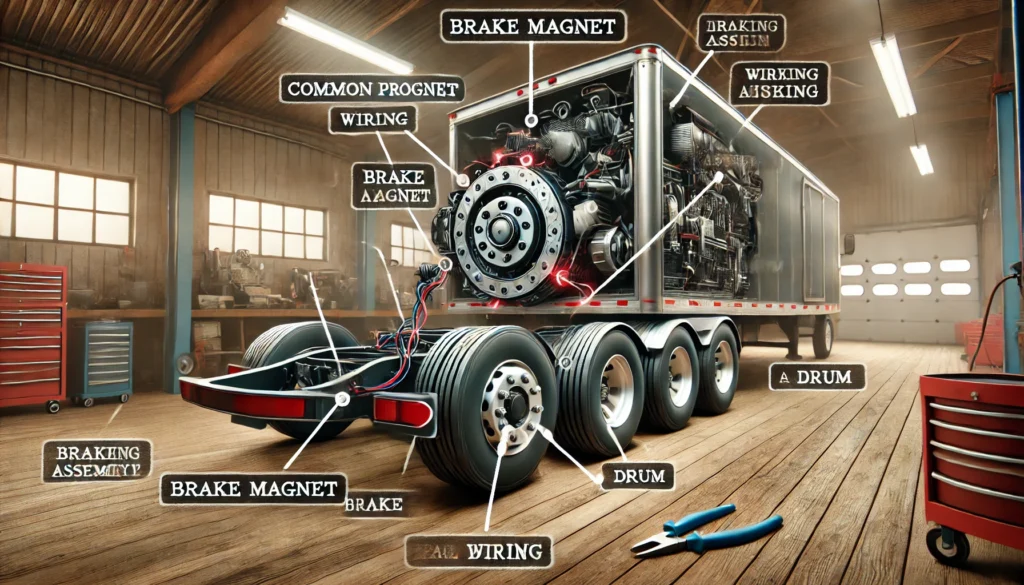Towing a trailer safely requires a reliable braking system, but even the best setups can encounter issues over time. Understanding electric trailer brake problems is crucial for maintaining your trailer’s safety and performance. In this article, we’ll discuss some of the most common issues with electric trailer brakes, their causes, and how to resolve them.

Common Electric Trailer Brake Problems
- Brakes Not Engaging
One of the most alarming problems is when the electric trailer brakes fail to engage. This issue can be caused by several factors:
- Faulty Wiring: Damaged or corroded wires can disrupt the electrical signal from the brake controller to the brake assemblies.
- Bad Ground Connection: A poor ground connection can prevent the brakes from receiving the necessary power to engage.
- Blown Fuse: If the fuse connected to the brake controller has blown, the brakes won’t activate.
Solution: Start by inspecting the wiring for any visible damage or corrosion. Check the ground connection to ensure it’s clean and secure. Finally, replace any blown fuses and test the brakes again.
- Weak or Inconsistent Braking
If your trailer’s brakes feel weak or inconsistent, it could indicate an issue with the brake magnets or the brake controller:
- Worn Brake Magnets: Over time, the magnets that engage the brakes can wear out, reducing their effectiveness.
- Incorrect Brake Controller Settings: If the brake controller isn’t properly calibrated for your trailer’s weight, the brakes may not apply enough force.
Solution: Inspect the brake magnets for wear and replace them if necessary. Adjust the brake controller settings according to the trailer’s load, ensuring that the brakes engage with the correct force.
- Overheating Brakes
Brakes that overheat can lose their effectiveness and cause significant damage to the braking system:
- Dragging Brakes: If the brakes are too tight, they may drag against the drum, generating excessive heat.
- Overloaded Trailer: An overloaded trailer puts extra strain on the brakes, leading to overheating.
Solution: Adjust the brake shoes to ensure they aren’t too tight against the drum. Make sure your trailer is within its weight capacity to prevent excessive strain on the brakes.
- Noisy Brakes
Noisy brakes can be an indication of a problem within the braking system:
- Worn Brake Shoes: Brake shoes that are worn down can cause squealing or grinding noises.
- Contaminated Brake Drum: Oil, grease, or dirt on the brake drum can cause noise when the brakes are applied.
Solution: Inspect the brake shoes and replace them if they are worn. Clean the brake drum thoroughly to remove any contaminants.
- Brakes Locking Up
If your trailer’s brakes are locking up, it could be due to:
- Faulty Brake Controller: A malfunctioning brake controller can send too much power to the brakes, causing them to lock up.
- Improperly Adjusted Brakes: If the brakes are adjusted too tightly, they may lock up when applied.
Solution: Test the brake controller to ensure it’s functioning correctly. Adjust the brake shoes to ensure they are not too tight.
Preventative Maintenance for Electric Trailer Brakes
To avoid common electric trailer brake problems, regular maintenance is essential:
- Inspect Wiring Regularly: Check the wiring for signs of wear, corrosion, or damage, and repair any issues promptly.
- Test the Brakes Before Each Trip: Make it a habit to test your trailer’s brakes before hitting the road. This will help you catch any issues early.
- Keep the Brake Drum Clean: Regularly clean the brake drum to remove any contaminants that could cause noise or reduce braking performance.
- Adjust the Brakes as Needed: Periodically check and adjust the brake shoes to ensure they are properly aligned with the drum.
Conclusion
Understanding and addressing electric trailer brake problems is key to ensuring your trailer remains safe and reliable on the road. By regularly inspecting and maintaining your braking system, you can prevent many common issues and enjoy worry-free towing. If you encounter any problems that you cannot resolve, consult a professional to ensure your brakes are in top condition.
